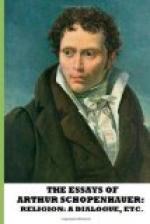protected by religion, which even makes them objects
of charity. How such charitable feelings bear
fruit may be seen, to take an example, in the great
hospital for animals at Surat, whither Christians,
Mohammedans and Jews can send their sick beasts, which,
if cured, are very rightly not restored to their owners.
In the same way when a Brahman or a Buddhist has a
slice of good luck, a happy issue in any affair, instead
of mumbling a Te Deum, he goes to the market-place
and buys birds and opens their cages at the city gate;
a thing which may be frequently seen in Astrachan,
where the adherents of every religion meet together:
and so on in a hundred similar ways. On the other
hand, look at the revolting ruffianism with which
our Christian public treats its animals; killing them
for no object at all, and laughing over it, or mutilating
or torturing them: even its horses, who form its
most direct means of livelihood, are strained to the
utmost in their old age, and the last strength worked
out of their poor bones until they succumb at last
under the whip. One might say with truth, Mankind
are the devils of the earth, and the animals the souls
they torment. But what can you expect from the
masses, when there are men of education, zoologists
even, who, instead of admitting what is so familiar
to them, the essential identity of man and animal,
are bigoted and stupid enough to offer a zealous opposition
to their honest and rational colleagues, when they
class man under the proper head as an animal, or demonstrate
the resemblance between him and the chimpanzee or
ourang-outang. It is a revolting thing that a
writer who is so pious and Christian in his sentiments
as Jung Stilling should use a simile like this, in
his Scenen aus dem Geisterreich. (Bk.
II. sc. i., p. 15.) “Suddenly the skeleton shriveled
up into an indescribably hideous and dwarf-like form,
just as when you bring a large spider into the focus
of a burning glass, and watch the purulent blood hiss
and bubble in the heat.” This man of God
then was guilty of such infamy! or looked on quietly
when another was committing it! in either case it
comes to the same thing here. So little harm
did he think of it that he tells us of it in passing,
and without a trace of emotion. Such are the
effects of the first chapter of Genesis, and, in fact,
of the whole of the Jewish conception of nature.
The standard recognized by the Hindus and Buddhists
is the Mahavakya (the great word),—“tat-twam-asi”
(this is thyself), which may always be spoken of every
animal, to keep us in mind of the identity of his inmost
being with ours. Perfection of morality, indeed!
Nonsense.




